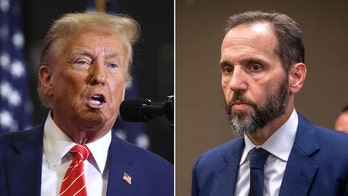It was 5:08 pm on August 2 when a particular Member of Congress approached one of the electronic voting machines in the House chamber. He inserted his voting card, pressed the green button for "aye" and then rushed out the door to board a plane for the August recess.
Back then, that lawmaker was just one of 435.
He returns to Capitol Hill today as the Republican nominee for Vice President of the United States.
Sometime late this afternoon, Rep. Paul Ryan (R-WI) will again dutifully insert his voting card into one of those machines and presumably punch the green key for "aye." Ryan hasn't visited the Capitol since Mitt Romney tapped the Congressman to become his running mate in early August. And Ryan returns to cast a vote on a stopgap spending bill to fund the government past September 30.
And that's about all the Wisconsin Republican is expected to do.
House Republicans are proud of Ryan. He's "one of them." He's a champion of slashing spending and eliminating the nation's burgeoning debt. The current batch of House Republicans don't have unanimity on much of anything. In fact, House Speaker John Boehner (R-OH) finds himself consistently courting Democrats to make up the difference when chunks of House Republicans defect on major pieces of legislation. But the budget blueprint authored by Ryan was one of the few measures most GOPers supported.
There was lots of chatter from Republicans early in the week when word came that Ryan would come to the Capitol to vote. Many hoped Ryan might address the House Republican Conference. Some imagined a big send-off. Perhaps a splashy press conference or a conclave with House Republican leaders.
However, all Ryan is planning to do is vote. He's not even expected to make a stop at his Congressional office in the Longworth House Office Building across the street from the Capitol. It's also unlikely that he'll pay a visit to the Budget Committee suite (Ryan chairs the panel) in the Cannon House Office Building nearby.
No one is saying for sure. But Republican sources suggest the Romney-Ryan camp don't want the Congressman dawdling too long on Capitol Hill. There are scores of pesky reporters and tourists lurking around the Capitol complex around with iPhones and notebooks, ready to shoot videos and ask questions.
You can hear it now.
"Congressman, why did Democrats appear to get a bump in the polls but you guys didn't?"
Or...
"Can you defend Mitt Romney's decision to criticize President Obama over the attacks in Egypt and Libya?"
The United States Capitol boasts the highest concentration of journalists in the world. There's way too much that can go wrong for a vice presidential nominee when he parachutes into an environment like this.
That's to say nothing of the image that Ryan is "part of Washington." He's served in Congress for nearly 14 years and toiled as a staffer here before that. But being a "part of Washington" is not the narrative this campaign wants to foster. Washington is "bad." Romney and Ryan are firemen rushing to extinguish the flames of a capital in crisis. The low approval ratings Congress scores don't meld with the script either.
Then there are potentially nettlesome images of Ryan milling about with fellow lawmakers.
These lawmakers were just Ryan's colleagues a month ago. But now, everything's different. What happens if a picture or video emerges of GOP Missouri Senate nominee Rep. Todd Akin (R-MO) chatting up Ryan? Or Ryan getting buttonholed by a polarizing figure like Reps. Allen West (R-FL) or Michele Bachmann (R-MN)? Or talking to (gasp) Democrats?
These are the optics that campaigns pay message masters to anticipate. And chances are, headquarters in Boston doesn't want Ryan to do much more than vote and flee the House chamber. Campaign stops on the hustings are controlled environments engineered by the campaigns. A visit to Congress is like a trip through a hall of mirrors at a carnival. The reflections of the candidate are too unpredictable and distorted.
What Ryan will vote on is controversial enough.
For today, the House has teed-up what's called a "Continuing Resolution," known as a "CR." The government's fiscal year starts October 1. But President Obama, the Senate and the House haven't enacted any of the 12 annual spending bills which fund the government. So in July, Mr. Obama, Boehner and Senate Majority Leader Harry Reid (D-NV) concocted a $1.047 trillion spending package to keep the government humming through March 27, 2013.
There's an inherent problem with this for Republicans and particularly for Ryan.
As chair of the Budget panel, Ryan cooked up a budget in the winter which spent $19 billion less than this package. So now Ryan, a champion of fiscal discipline, returns to Washington and is expected to vote yes on a measure which flies in the face of his own budget.
Of course, the option is worse for Ryan if he were to vote no. Democrats would absolutely pounce on the Congressman, arguing that Ryan voted to "shut down the government."
What's interesting is that a chunk of House Republicans are expected to vote no on the CR. House Majority Whip Kevin McCarthy (R-CA) brushed off a suggestion that his side couldn't provide the majority of yeas for the measure. But still, a sizable contingent of noes from the Republican side of the aisle reflects fissures which have bedeviled the GOP for nearly two years. In short, it looks bad if the Republican Vice Presidential Nominee votes in favor of something and a substantial number of lawmakers from his own party vote the other way.
"$1.047 (trillion) is not a number that I like," said Rep. Raul Labrador (R-ID) Wednesday. "I think it's an astronomical number."
House Appropriations Committee Chairman Hal Rogers (R-KY) authored the CR. In fact, Rogers believes Ryan's presence actually encourages fellow Republicans to say yes to the package.
"He's a hero in the Republican Caucus here in the House. One of us," said Rogers. "The fact that he's voting for it sends the signal to every one else that it's a good thing."
But there's another potential trap in this legislation.
You won't find anything about federal money for Egypt and Libya even if you read the bill. But by definition, CR's essentially renew the old spending policies. That's why the old legislation included a section about the U.S. spending $20 million "to promote democracy, transparent and accountable governance, human rights, transitional justice and the rule of law in Libya."
Hal Rogers says there's no way to strip out that language now.
"The Continuing Resolution bill is already filed. It's already sort of set in concrete before Libya happened," Rogers said. "However, if the authorizing committee in the House and leadership decides they would like to do something about Libya, certainly I will smartly salute and go do it."
But if it comes to that, Rep. Tom McClintock (R-CA) still isn't satisfied.
"I was a no before but now I'm a hell no," boasted McClintock when told about the Egypt and Libya money.
And then there are future battles.
Congress may be able to keep the government open. But one issue that remains completely unresolved is the farm bill.
"The odds are too complicated for me to figure on this one," lamented House Agriculture Committee Chairman Frank Lucas (R-OK). "There are many who have the excuse to say the plate is totally full. After the CR is addressed tomorrow and over the next three legislative days there will be time to address these issues."
The inability of Congress to settle the farm bill could place farmers at risk in the coming months. And the first sector that gets whacked would be the dairy program. A failure to pass a farm bill or renew existing policy means the dairy program reverts to a price system set in 1949.
Guess who's from a major, milk-producing state and could get siphoned into a discussion about what the next administration would do about the nation's dairy programs?
In September 2008, the U.S. stood on the brink of economic collapse. The House of Representatives initially failed to approve the now much-maligned bailout package known as "TARP." A couple of days later, both Sens. Barack Obama (D-IL) and John McCain (R-AZ) came off the campaign trail to cast yea votes for TARP. The Senate approved the measure with the help of both candidates. But a few minutes before the vote, I found Mr. Obama off the Senate floor chatting with the late-Sen. Robert Byrd (D-WV). Byrd was infirm and wheelchair bound by that point. The president pulled up a seat next to Byrd and clasped the hand of the legendary senator for about 45 seconds.
"Hey, how are you?" he asked Byrd. President Obama then signed a copy of Byrd's book titled "A Letter To the Next President."
I caught up with the president in a back hallway later and asked him if he'd miss the Senate if elected.
"Absolutely, absolutely, absolutely," he said. "I love it here."
The House of Representatives has been the scene of some bruising battles lately. A slate of pitched skirmishes is set to unfold there in November and December. Lawmakers will scrap over taxes, the debt ceiling, mandatory spending cuts, a farm bill and a host of other issues. Republicans believe a Romney-Ryan victory will mute some of those fisticuffs. But if not, Paul Ryan will find himself right back in the fray.
Ryan returns to that fray today. Like candidate Obama, he may be happy to be back at the Capitol for a few hours. But Ryan's elevation in political stature changed the Capitol for him. He can't go back to being one in a sea of 435 - even though he was just one in a sea of 435 last month - shoving his card into a voting machine in the House chamber and bolting for the door.
He'll do the same today.
But things are a lot different now for Paul Ryan.




